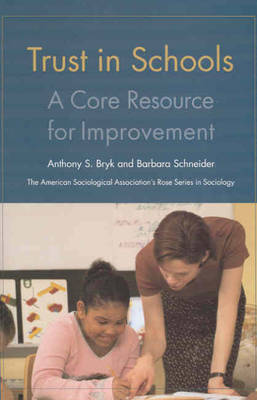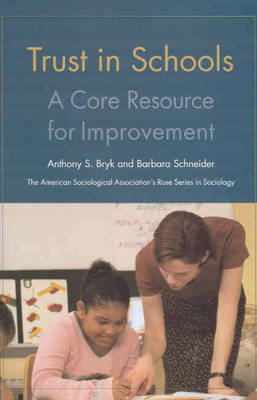
- Retrait gratuit dans votre magasin Club
- 7.000.000 titres dans notre catalogue
- Payer en toute sécurité
- Toujours un magasin près de chez vous
- Retrait gratuit dans votre magasin Club
- 7.000.0000 titres dans notre catalogue
- Payer en toute sécurité
- Toujours un magasin près de chez vous
41,45 €
+ 82 points
Description
Most Americans agree on the necessity of education reform, but there is little consensus about how this goal might be achieved. The rhetoric of standards and vouchers has occupied center stage, polarizing public opinion and affording little room for reflection on the intangible conditions that make for good schools. Trust in Schools engages this debate with a compelling examination of the importance of social relationships in the successful implementation of school reform. Over the course of three years, Bryk and Schneider, together with a diverse team of other researchers and school practitioners, studied reform in twelve Chicago elementary schools. Each school was undergoing extensive reorganization in response to the Chicago School Reform Act of 1988, which called for greater involvement of parents and local community leaders in their neighborhood schools. Drawing on years longitudinal survey and achievement data, as well as in-depth interviews with principals, teachers, parents, and local community leaders, the authors develop a thorough account of how effective social relationships--which they term relational trust--can serve as a prime resource for school improvement. Using case studies of the network of relationships that make up the school community, Bryk and Schneider examine how the myriad social exchanges that make up daily life in a school community generate, or fail to generate, a successful educational environment. The personal dynamics among teachers, students, and their parents, for example, influence whether students regularly attend school and sustain their efforts in the difficult task of learning. In schools characterized by high relational trust, educators were more likely to experiment with new practices and work together with parents to advance improvements. As a result, these schools were also more likely to demonstrate marked gains in student learning. In contrast, schools with weak trust relations saw virtually no improvement in their reading or mathematics scores. Trust in Schools demonstrates convincingly that the quality of social relationships operating in and around schools is central to their functioning, and strongly predicts positive student outcomes. This book offer insights into how trust can be built and sustained in school communities, and identifies some features of public school systems that can impede such development. Bryk and Schneider show how a broad base of trust across a school community can provide a critical resource as education professional and parents embark on major school reforms. A Volume in the American Sociological Association's Rose Series in Sociology
Spécifications
Parties prenantes
- Auteur(s) :
- Editeur:
Contenu
- Nombre de pages :
- 240
- Langue:
- Anglais
- Collection :
Caractéristiques
- EAN:
- 9780871541796
- Date de parution :
- 16-12-04
- Format:
- Livre broché
- Format numérique:
- Trade paperback (VS)
- Dimensions :
- 180 mm x 228 mm
- Poids :
- 362 g

Les avis
Nous publions uniquement les avis qui respectent les conditions requises. Consultez nos conditions pour les avis.






